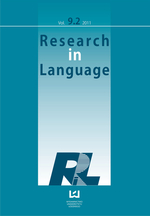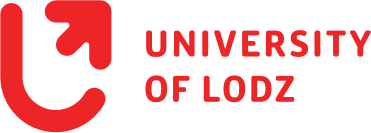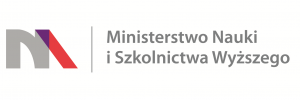Research in Language

Research in Language
Zadanie „Zwiększenie udziału zagranicznych recenzentów w ocenie artykułów przeznaczonych do publikacji w kwartalniku “Research in Language” finansowane w ramach umowy nr 948/P-DUN/2016 ze środków Ministra Nauki i Szkolnictwa Wyższego przeznaczonych na działalność upowszechniającą naukę
Aims and scope:
Research in Language (RiL) is an international journal committed to publishing excellent studies in the area of linguistics and related disciplines focused on human communication. Language studies, as other scholarly disciplines, undergo two seemingly counteracting processes: the process of diversification of the field into narrow specialized domains and the process of convergence, strengthened by interdisciplinarity. It is the latter perspective that RiL editors invite for the journal, whose aim is to present language in its entirety, meshing traditional modular compartments, such as phonetics, phonology, morphology, syntax, semantics, and pragmatics, and offer a multidimensional perspective which exposes varied but relevant aspects of language, e.g. the cognitive, the psychological, the institutional aspect, as well as the social shaping of linguistic convention and creativity.
Affiliated at the crosswords between Eastern and Western Europe and between the Slavic and the Anglo-American tradition, RiL is uniquely suited not only to represent current linguistics research, but also provoke confrontation and provide a forum for discussion for researchers rooted in different schools, distant both in theory and geographical space, from Europe and beyond.
Research in Language jest międzynarodowym czasopismem językoznawczym wydawanym w dwóch formatach: w formie drukowanej nakładem Wydawnictwa Uniwersytetu Łódzkiego oraz w formie elektronicznej na platformie Sciendo: https://content.sciendo.com/view/journals/rela/rela-overview.xml
Publisher: Lodz University Press
All articles are available in Open Access CC BY-NC-ND
***
Cel i zakres tematyczny:
Research in Language (RiL) publikuje artykuły przedstawiające rezultaty nowych badań językoznawczych, zorientowany jest przede wszystkim na teksty prezentujące rezultaty badań empirycznych, które mają istotne znaczenie dla lingwistyki stosowanej bądź teoretycznej. Poprzez koncentrację na naturze języka naturalnego i zjawiskach komunikacji RiL stanowi forum wymiany myśli dla językoznawców oraz osób pracujących w dyscyplinach pokrewnych, takich jak socjolingwistyka, psycholingwistyka, kognitywistyka, etc.
- Recenzenci współpracujący z redakcją w roku 2017 / Reviewers cooperating with the journal in 2017:
- Adrian Tien (University of Dublin)
- Tahir Wood (University of the Western Cape)
- Jacqueline Visconti (University of Birmingham),
- Winnie Cheng (The Hong Kong Polytechnic University)
- Recenzenci współpracujący z redakcją w roku 2016 / Reviewers cooperating with the journal in 2016:
- Jan Volin (Institute of Phonetics, Prague)
- Linda Shockey (University of Reading)
Wydawca: Wydawnictwo Uniwersytetu Łódzkiego
Wszystkie artykuły dostępne są w Otwartym Dostępie (Open Access) na licencji CC BY-NC-ND
Komentarze
O CZASOPIŚMIE
- Iwona Witczak-Plisiecka, University of Łódź, Poland
- Ewa Waniek-Klimczak, University of Łódź, University of Łódź, Poland
- Barbara Lewandowska-Tomaszczyk, University of Łódź, Poland
- Jacob Mey (University of Southern Denmark)
- Robyn Carston (University College London, UK)
- Winnie Cheng (The Hong Kong Polytechnic University)
- Belén Soria Clivillés (University of Granada, Spain)
- Una Cunningham (Uppsala University, Sweden)
- Tracey Derwing (Simon Fraser University, Canada)
- Pamela Faber (University of Granada, Spain)
- Jacek Fisiak (Adam Mickiewicz University, Poland)
- Esther Romero González (University of Granada, Spain)
- Magnus Huber (Justus-Liebig-Universitaet Giessen, Germany)
- Richard Hudson (University College London, UK)
- Andreas H. Jucker (University of Zurich, Switzerland)
- Kepa Korta (University of the Basque Country)
- Tomasz P. Krzeszowski (Warsaw University, Poland)
- Dennis Kurzon (University of Haifa, Israel)
- Ronald W. Langacker (University of California, San Diego, USA)
- Jan Majer (University of Łódź, Poland)
- Michael Oakes (University of Sunderland)
- John Osborne, (University of Savoy at Chambery, France)
- Manuel Padilla-Cruz (University of Seville, Spain)
- Mirosław Pawlak (State University of Applied Sciences in Konin, Poland)
- Hans Sauer (University of Munich, Germany)
- Linda Shockey (University of Reading, UK) [Special Issue Editor]
- Marina Sbisà, (University of Trieste, Italy)
- Piotr Stalmaszczyk (University of Łódź, Poland)
- Stella Tagnin (University of São Paulo, Brazil)
- Jan Volin (Charles University in Prague, Czech Republic)
- Steve Walsh (University of Newcastle, UK)
- Beatrice Warren (University of Lund, Sweden)
- Deirdre Wilson (University College London, UK & CSMiN, Oslo, Norway)
- Igor Ž. Žagar (University of Maribor, Slovenia)
- Przemysław Ostalski, University of Łódź, Poland
- Martin Hinton, University of Łódź, Poland
- Paul Wilson, University of Łódź, Poland
- Michał Kornacki, University of Łódź, Poland
- Research in Language
- University of Lodz
- ul. Pomorska 171/173, 91-404, Lodz, Poland
- e-mail: ril@uni.lodz.pl
Komentarze
Author fees
This journal charges the following author fees.
Article Submission: 0.00 (PLN)
The journal does not charge for submission of the manuscript.
Article Publication: 0.00 (PLN)
The journal does not charge for processing or publication of the manuscript.
PEER-REVIEW PROCESS
The review process is arranged by double-blind system. Every text is subject to at least two reviews. Journals of University of Lodz are publishing scientific articles only after double-blind review, language and technical edition. We do not share our articles in pre-publication.
Instructions for Authors
- Copyright: Authors are responsible for observing the laws of copyright when quoting or reproducing material.
- Submissions should be made electronically as e-mail attachments at the following address: ril@uni.lodz.pl.
- All submissions should be made electronically (in Word for Windows .doc files or compatible).
- Document setup: The main body of the text is 118 mm x 170mm which does not include running headers and footnotes (the full physical page size including all margins will be 148mm x 210mm).
The page size is A5 (14.8cm x 21cm), margins as follows:
Top: 2.5cm
Bottom: 1.5cm
Left: 2.1cm
Right: 2.1cm
Header: 1.5cm
Footer: 0
Font: Times New Roman
Main text 10 point
Notes and Quotations 9 point (quotations both side-indentation 5mm, single empty line before and after)
Primary headings 16 point, title case
Secondary headings 12 point, bold
Paragraph indentations .5mm
References hanging indentation .5mm
Ensure that each chapter of your text, as well as frontmatter (dedication, title, preface, forward, introduction or introductory note, contents ) and endmatter (appendixes, endnotes, bibliographies, index) begins on a new page.
Use Times New Roman: 10 pts fonts for the main text and all additional parts except endnotes and index (where you should use 9pts), and chapter headings (where you should use 16pts). All text should be single-spaced.
Chapters: Begin a chapter with the word ‘chapter’ followed by a number, centred, font size: 16pt, small caps:
CHAPTER ONE
Leave an empty line (font size: 10pt) and follow it by the entire title formatted in the same way (with no full stop at the end). Add three empty lines (font size: 10pt) before the first line of text. Remember that each chapter begins on a new page.
Parts: If you would like to gather chapters into a number of parts in the book, then use a new page for the title of the part, which you should position somewhere in the top half of the page (make sure that all parts headings are positioned in exactly the same way). Use capitalised Roman numerals for the part number as follows:
Part I
or
Part IX
Subheadings within chapters: For A-level subheadings, use 12pts, in bold. Leave two empty lines before, and one empty line after the subheading. For B-level subheadings, use 11pts in bold (same as remainder of the text). Again, leave two empty lines before and one empty line after the subheading. Make sure all empty lines are 10pt.
Appendixes: Treat as chapters, replacing the number by a letter:
APPENDIX C
- Number your pages with font size 9pts. For even pages place the number flush left, while for odd number pages, flush right. All material before the introduction should be numbered using Roman numerals, all material after, using Arabic numerals.
- Place a running header in the centre of every page except the first (title) page of each chapter, appendix, or preface, acknowledgement, foreword, table of contents, illustrations, notes, index, etc. Even numbered pages should read ‘Chapter (Number spelled out)’ and odd numbered pages the title of the chapter. If the title is too long, use an abbreviated version (there are no hard and fast rules – use your judgement for how best to abbreviate it). Use 9pts for all headers, and capitalise.
- References should conform to the following examples:
Book:
Allerton, D. J. 1982. Valency and the English Verb. New York: Academic Press.
Hale, K. and S. J. Keyser (eds). 1993. The View from Building 20: Essays in Linguistics in Honour of Sylvain Bromberger. Cambridge, Mass.: MIT Press.
Joyce, P. W. 1979. English as We Speak it in Ireland. Dublin: Wolfhound Press. [Originally published in 1910 by Gill & Son, Ltd, Dublin].
Lakoff, G. and M. Johnson. 1980. Metaphors We Live By. Chicago: Chicago University Press.Article in journal:
Kemmer, S. and A. Verhagen. 1994. The grammar of causatives and the conceptual structure of events. Cognitive Linguistics 5: 115–156.Article in collection of articles:
Chomsky, N. 1993. A minimalist program for linguistic theory. In K. Hale and S. J. Keyser (eds) The View from Building 20: Essays in Linguistics in Honour of Sylvain Bromberger. Cambridge, Mass.: MIT Press: 1–39.
PUBLICATION ETHICS
Author Responsibilities
Reporting standards: authors reporting results of original research should present an accurate account of the work performed as well as an objective discussionof its significance. The underlying data should be represented accurately in the manuscript. The paper should contain sufficient details and references to permit others to replicate the work. Fraudulent or knowingly inaccurate statements constitute unethical behaviour and are unacceptable.
Originality and Plagiarism: authors should ensure that they have written entirely original works, and if they have used the work and/or words of others, they should ensure that this has been appropriately cited or quoted.
Multiple, redundant or concurrent publications: in general, authors should not publish manuscripts describing essentially the same research in more than one journal or primary publication. Parallel submission of the same manuscript to more than one journal constitutes unethical publishing behaviour and is unacceptable.
Acknowledgement of sources: appropriate acknowledgement of the work of others must be given at all times. Authors should also cite publications that have been influential in determining the nature of the reported work.
Authorship of the manuscript: authorship should be limited to those who have made a significant contribution to the conception, design, execution, or interpretation of the reported study. All those who have made significant contributions should be listed as co-authors. Where there are others who have participated in certain substantive aspects of the research project, they should be named in the “Acknowledgements” section.
The corresponding author should ensure that all appropriate co-authors (according to the above definition) and no inappropriate co-authors are included in the author’s list of the manuscript, and that all co-authors have seen and approved of the final version of the paper and have agreed to its submission for publication.
Hazards and human or animal subjects: if the work involves chemicals, procedures or equipment that have any unusual hazards inherent in their use, the must clearly identify these in the manuscript.
Disclosure and conflicts of interest: it takes place when the author has a financial, commercial, legal, or professional relationship with other organizations whichcould influence his research. This is why all authors should disclose in their manuscript any financial or other substantive conflicts of interest that might be construed to influence the results or their interpretation in the manuscript. All sources of financial support for the project should be disclosed.
Fundamental errors in published works: when the discovers a significant error or inaccuracy in his/her own published work, it is the author’s obligation to promptly notify the journal’s editor or publisher and cooperate with them in order to either retract the paper or to publish an appropriate erratum.
Editor Responsibilities
Accountability: the editor of a peer-reviewed journal is responsible for deciding which articles submitted to the journal should be published, and, moreover, is accountable for everything published in the journal. In making these decisions, the editor may be guided by the policies of the journal’s editorial board as well as by legal requirements regarding libel, copyright infringement and plagiarism. The editor may confer with other editors or reviewers when making publication decisions. The editor should maintain the integrity of the academic record, preclude business needs from compromising intellectual and ethical standards (e.g. ethical conduct of research using animals and human subjects, publication on vulnerable populations or groups of people), and always be willing to publish corrections, clarifications, retractions and apologies when needed.
Fairness: the editor should evaluate manuscripts for intellectual content without regard to the race, gender, sexual orientation, religious belief, ethnic origin, citizenship, or political philosophy of the author(s). The editor will not disclose any information about a manuscript under consideration to anyone other than the author(s), reviewers and potential reviewers, and in some instances the editorial board members, as appropriate.
Confidentiality: the editor and any editorial staff must not disclose any information about a submitted manuscript to anyone other than the corresponding author, reviewers, potential reviewers, other editorial advisers, and the publisher, as appropriate.
Complaints and appeals: The publishing contacts (whistleblowers) are requested to help the editor to record and document the claim (e.g. data manipulation or fabrication, text recycling, plagiarism, research misconduct). The report should include:
– specific information about the case (who, what, when, where, why),
– in case of plagiarism and text recycling, details should be given about the relevant texts/articles.
Disclosure, conflicts of interest, and other issues: the editor shall be guided by COPE’s Guidelines for Retracting Articles when considering retracting, issuing expressions of concern about, and issuing corrections pertaining to articles that have been published.
Unpublished materials disclosed in a submitted manuscript must not be used in an editor’s own research without the express written consent of the author. Privileged information or ideas obtained through peer review must be kept confidential and not used for personal advantage.
The editor is committed to ensuring that advertising, reprint or other commercial revenue has no impact or influence on editorial decisions.
The editor should seek to ensure a fair and appropriate peer review process. Editors should recuse themselves (i.e. should ask a co-editor, associate editor or another member of the editorial board instead to review and consider the manuscript) from considering manuscripts in which they have conflicts of interest resulting from competitive, collaborative, or other relationships or connections with any of the authors, companies, or (possibly) institutions connected to the papers. Editors should require all contributors to disclose relevant competing interests and publish corrections if competing interests are revealed after publication. If needed, other appropriate action should be taken, such as the publication of a retraction or expression of concern.
Involvement and cooperation in investigations: Editors should guard the integrity of the published record by issuing corrections and retractions when needed and pursuing suspected or alleged research and publication misconduct. Editors should also pursue reviewer and editorial misconduct. An editor should take reasonably responsive measures when ethical complaints have been presented concerning a submitted manuscript or published paper.
Editors encourage readers to send by e-mail their opinions related to the material published. Editors are open to post-publication discussion.
Editors and editorial team members are excluded from publication decisions when they are authors or have contributed to a manuscript.
Reviewer Responsibilities
Contribution to editorial decisions: peer review assists the editor in making editorial decisions and, through editorial communication with the author, may also assist the author in improving the manuscript.
Promptness: any invited reviewer who feels unqualified to review the research reported in a manuscript or knows that its timely review will be impossible should immediately notify the editor so that alternative reviewers can be contacted.
Confidentiality: any manuscripts received for review must be treated as confidential documents. They must not be shown to or discussed with others except if authorized by the editor.
Standards of objectivity: reviews should be conducted objectively. Personal criticism of the author is unacceptable. Referees should express their views clearly with appropriate supporting arguments.
Acknowledgement of sources: reviewers should identify any relevant published work that has not been cited by the authors. Any statement that an observation, derivation, or argument was previously reported should be accompanied by a relevant citation. A reviewer should also call to the editor’s attention any substantial similarity or overlap between the manuscript under consideration and any other published data of which they have personal knowledge.
Disclosure and conflict of interest: privileged information or ideas obtained through peer review must be kept confidential and not used for personal advantage. Reviewers should not consider evaluating manuscripts in which they have conflicts of interest resulting from competitive, collaborative, or other relationships or connections with any of the authors, companies, or institutions connected to the submission.
Publisher responsibilities
Complaints and appeals: The Publisher is obliged to collect and share with journal editors all complains and appeals against the journal, its staff, editorial board and the Publishing Company itself. The company is also obliged to inform COPE, when there is any violation of Publication Ethics and any other regulations applicable in Lodz University Press.
Komentarze
Research in Language is covered by the following services:
- Arianta
- Baidu Scholar
- CEJSH (The Central European Journal of Social Sciences and Humanities)
- Celdes
- CNKI Scholar (China National Knowledge Infrastructure)
- CNPIEC
- EBSCO (relevant databases)
- EBSCO Discovery Service
- Elsevier – SCOPUS
- ERIH PLUS (European Reference Index for the Humanities and Social Sciences)
- Genamics JournalSeek
- Google Scholar
- Index Copernicus
- International Medieval Bibliography
- J-Gate
- JournalTOCs
- Linguistic Bibliography Online
- Linguistics Abstracts Online
- MLA International Bibliography
- Naviga (Softweco)
- Primo Central (ExLibris)
- ProQuest (relevant databases)
- ReadCube
- ResearchGate
- SCImago (SJR)
- Summon (Serials Solutions/ProQuest)
- TDOne (TDNet)
- Ulrich’s Periodicals Directory/ulrichsweb
- WorldCat (OCLC)
Komentarze
Research in Language
ul. Pomorska 171/173, 90-236, Lodz
ril@uni.lodz.pl


